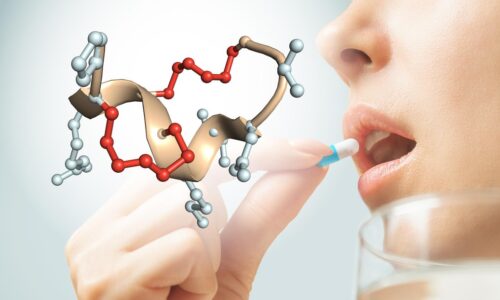An exocrine tripeptide secreted by the hypothalamus known as Protirelin was formerly known as Thyrotropin-releasing hormone. It was initially produced and isolated from sheep and pig hypothalamus tissue in the late 1960s. TRH is abundant throughout the brain, spinal cord, and other major organ systems. Additionally, it works as an endogenous excitatory neurotransmitter, which may have a wide variety of actions, both centrally and peripherally. The analgesic action of morphine is not affected by this compound’s ability to antagonize endogenous opioid receptors. The anti-shock properties of Protirelin were discovered quite early in the medication’s development.

Protirelin’s pharmacological actions
According to research, the analgesic, addictive, braking, respiratory depression-inducing, and fatal effects of morphine medications are not entirely antagonized by Protirelin. When Protirelin was used in an experiment on a guinea pig colon, it did not crush DHE to reduce its contraction, but it did move the concentration-response curve to the left. Protirelin is thus more effective than naloxone in treating post-traumatic stress disorder (PTSD). Breathing became more rapid, although heart rate hardly changed. The blood pressure raised slightly, but the heart rate slightly changed. Normal animals’ respiratory, circulatory, and central nervous systems are stimulated by Protirelin, which does not interfere with morphine’s analgesic effects, as mentioned above.
Protirelin Has a Variety of Other Uses
In endocrinology, Protirelin treats hypothalamic hypothyroidism and central hyperthyroidism in addition to treating shock. Depression and schizophrenia may be treated with this substance as well, as shown by scientists. Neurology is utilized to treat brain and spinal cord injuries, comas for different causes, amyotrophic lateral sclerosis, spinocerebellar degeneration, senile dementia, and epilepsy, for example. It is also used to treat other neurological disorders. To find out whether a patient has hyperthyroidism, doctors employ diagnostic. Because of this, Protirelin is a promising medicine that deserves more study to widen its range of use.
Some subjects may have hazardous and even fatal adverse effects while taking a medicine, even if this may be the case seldom. If you encounter the following signs or symptoms while administering this medication, cease use immediately.
If your subjects have any of the following symptoms of an allergic reaction: an itchy or swollen rash; an itchy patch or hives; a fever; a red rash; a blistering rash; an unusually hoarse voice; or swelling of the mouth or throat, cease use immediately and make sure you are wearing protective equipment.
Protirelin might also cause additional adverse effects.
Side effects are possible with every medicine. Although some subjects have none or minimal adverse effects, others have mild side effects or just minor side effects. If any of these adverse or other side effects appear or do not go away, cease use as mentioned above.
- A warm, comforting sensation.
- Stomach ache.
- You are urinating more often.
- Headache.
- Dizziness.
- Flushing.
- Pain in the abdomen.
- Pain in the lower abdomen.
These are only some of the possible adverse effects. Be aware of the safety measures when working with peptides if you have any concerns about the side effects. Cease use of these substances if your subjects experience any adverse side effects. Buy Protirelin peptide from a trusted source, such as Biotech Peptides USA, if you are a scientist interested in further researching this compound’s benefits and side effects.




